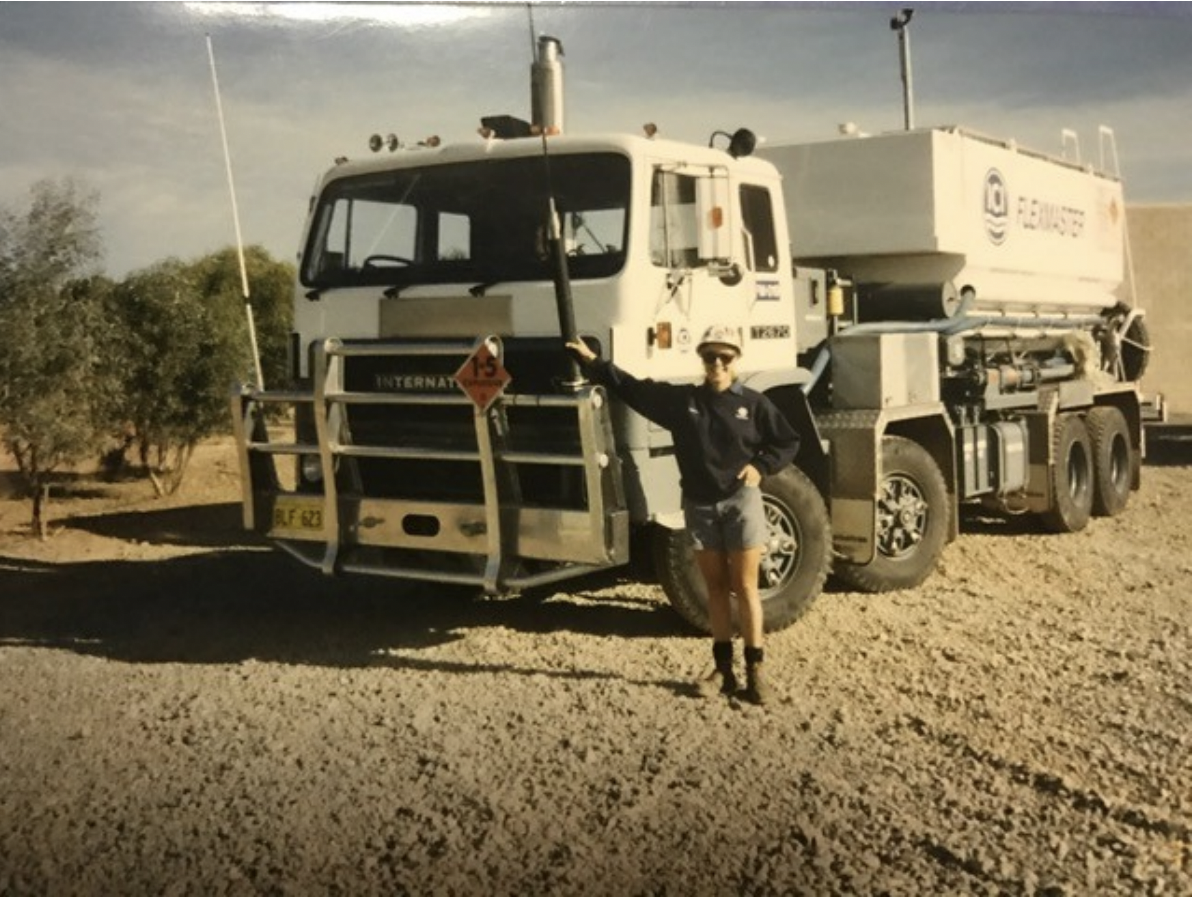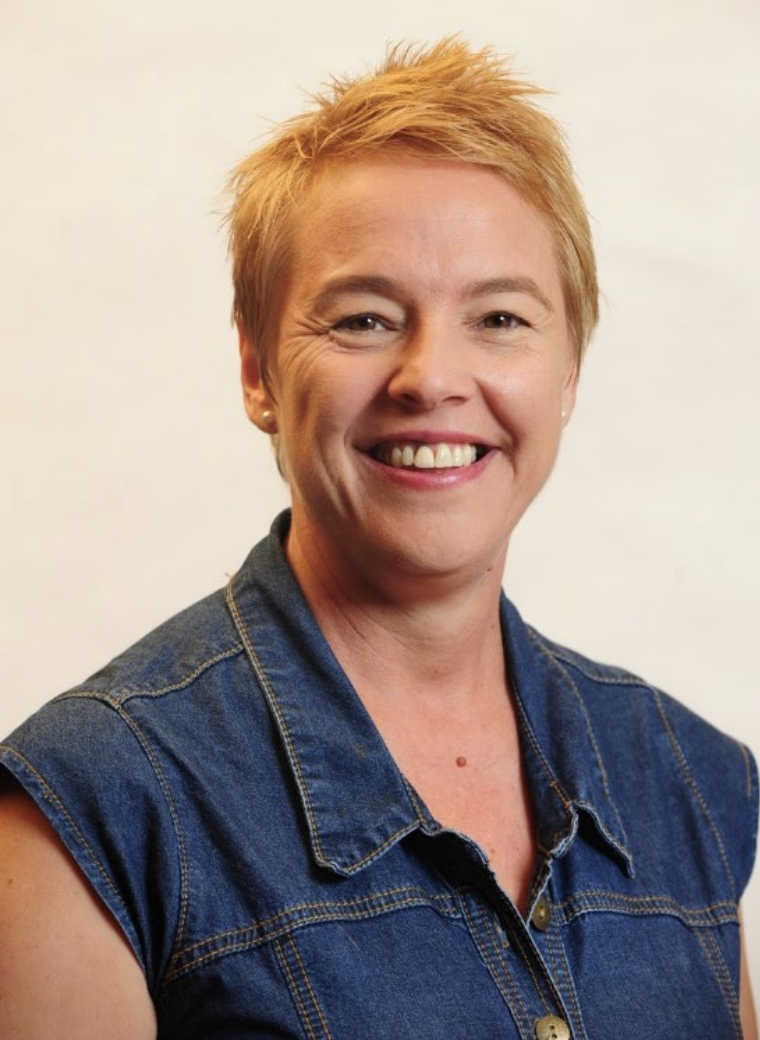Like many teenagers, Theresa Sonneveld’s grand career plan went something like this: earn money, travel, earn more money, more travel.
“After odd jobs and travelling, I returned home to Kalgoorlie and applied to ICI (now Orica).”
Theresa became Orica’s first ever female Mobile Manufacturing Unit (MMUTM) Operator.
An MMU Operator drives a truck that contains separate compartments of raw materials for making explosives. The truck is driven down onto the bench at the mine site, the explosives are made onsite in real time by the operator and pumped down the blast hole.
“I didn’t even have a truck licence when I was offered the job!”
Theresa didn’t just survive the 6-month training program – she thrived. After obtaining her truck licence in her own time, she enjoyed working in mines all over Western Australia.
The diversity of the job – travelling and meeting new people and new teams – appealed and she stayed in this role for seven years, meeting her future husband along the way.
“Both of us loved to travel. That is the beauty of working for Orica – there are so many opportunities to travel.”
One month after successfully applying to become an MMU
Operator in Tasmania and relocating with her husband, her new supervisor resigned.
She had already completed several internal leadership courses and, recognising her potential, her manager offered her the role.
“I was horrified!”
Always her biggest supporter, Theresa’s husband encouraged her to ‘go for it’.
Within two years she was running two plants. By the third year she was the Underground Contracts Manager, dealing with clients and building customer relationships.
Again, she found herself outside her comfort zone but learning through hands-on exposure, on the job.
Her role then expanded to become State Operations Manager, covering all mines (above ground, below ground, open cut), before a sideways move to NSW to take on the larger role of Operational Superintendent, responsible for 80 reports.
“My manager had fantastic belief in my abilities and actively encouraged my career development. He also provided many opportunities to broaden my networks with other managers within the company.”
“There weren’t many female managers, so I was easy to spot in a crowd.”
Her next move, to the Hunter Valley, was pivotal.
“For an Operational Superintendent, it is a pinnacle location for the role. It is complex, has a long history and is a tight knit community.”
“They can be hard nuts to crack!”
Theresa believes her experience coming from the ground up immediately established a level of respect for her.
“I could walk the talk and understood their work – I had worked in the pits, driven trucks, etc.”
Fast forward to today, Theresa is Senior Manager – Operations Support AusPac.and is celebrating 27 years with Orica.
She is also a Mum and is fortunate to have a very supportive husband at home caring for their children.
“My husband has been my biggest advocate. He is a stay–at–home dad and works part time because we made the decision to have one parent at home. He has been integral to pulling me through the bad times when I doubted myself.”
Theresa acknowledges that it can be very difficult for women in the mining industry.
“I don’t think I was ever given an easy path and I did miss out on some roles. I’ve alwayshad to work really hard to prove myself”.
But she also relishes the challenge.
“All of my roles have been very different and kept it exciting and new and interesting.”
“I love what I do!”
4 Questions
1. What have been some of the unexpected challenges you have come across?
The hardest thing I’ve had to do is attract and bring women into the industry, out in the field. Although we were successful recruiting women, we weren’t able to retain many. I really wish I had nailed that and given them the tools they needed to stick it out!
2. What role have mentors (formal and/or informal) played in your career journey
Mentors have been so important. Informally, my husband has been my biggest advocate. He is a stay–at–home dad and he has been integral to pulling me through the bad times when I doubted myself.
My coach was a senior manager and was also a powerful advocate. He used to be my formal mentor and we continue to be a sounding board for each other as well as being friends.
My line managers have always been supporters as well and helped me with input into my strengths and weaknesses.
3. What advice do you have for operational businesses seeking to attract and retain more women?
Firstly, look at your advertising – we found there was nothing targeting women!
Realise that we need to give women training in advance about what to expect in the industry. They need tools to be able to cope within their new situation.
We can do lot more for people who don’t know about our industry using new media – telling more stories about the good, the bad… and the dirt and grime! We need more visibility and more honesty!
We could run pit tours, bus tours and all sorts of career days showcasing what’s possible. There are so many avenues to come into our business.
NAWO membership is also a great way for raising the profile of gender diversity within the leadership team.
4. What advice would you give women embarking on a career in operations?
Be resilient! Don’t take it all so seriously – have a bit of fun! It is still very male dominated, so come in with an open mind. Don’t be afraid to be who you are – speak up and be counted! Be true to who you are.
You will meet some fantastic people. Seek out those who are like–minded and build your network but challenge yourself to move outside your comfort zone as well.
And make sure you have conversations about parenting with your partner well before you even have children.

